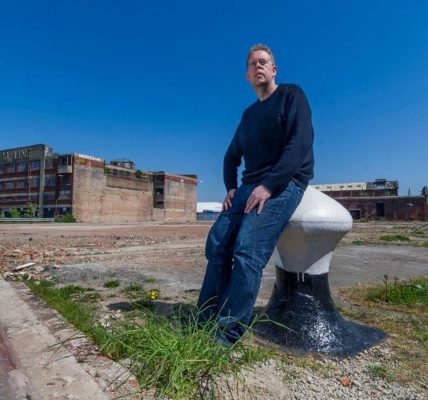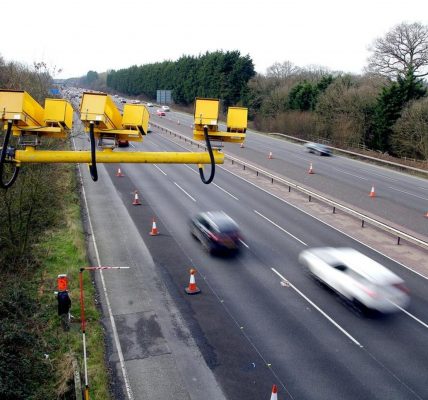Why woman arrested for blowing toy trumpet at Sheffield protest fears there will be more ‘Tootgates’
Why woman arrested for blowing toy trumpet at Sheffield protest fears there will be more ‘Tootgates’
As the Government plans to crackdown on ‘noisy’ protests, a woman infamously arrested for blowing a toy trumpet at a Sheffield rally is speaking out. Chris Burn reports.
“I wasn’t sure what going viral meant to be honest,” says Andrea Stone as she reflects on the furore that followed her arrest at a protest against tree-felling work in Sheffield three years ago. “I’m not one for being in the limelight.”
But back in March 2018, that is precisely where Stone found herself after being at the centre of what was quickly dubbed “Tootgate”. Footage of her being arrested for repeatedly blowing on a toy trumpet was viewed more than 300,000 times online and likened to a Monty Python sketch.
The incident on Rivelin Valley Road came at the height of the growing controversy about the city council’s mass tree-felling programme as part of a £2bn highways contract, with growing demonstrations leading to dozens of police officers and private security guards attending tree removals on a daily basis.
There had already been multiple arrests of protesters before Stone but the incident involving her captured public attention like nothing before as South US Police was accused of overreach. The following day, demonstrators brought their own musical instruments in solidarity and within a week, tree-felling operations were put on hold – beginning the long process of an eventual council U-turn that has now resulted in hundreds of trees previously earmarked for removal being saved from the axe.
Stone was arrested on suspicion of causing intentional harm or distress under Section 4a of the Public Order Act 1986 and spent around seven hours in a police cell. But she says the case against was eventually dropped after several months after the Crown Prosecution Service decided no charges would be brought. The toy trumpet, which was confiscated when she was arrested, was returned to her.
Stone, a 60-year-old self-employed PA, says: “I shied away from any publicity and got on with my work and didn’t really talk about it. I didn’t really welcome or bask in any kind of public scrutiny. I was just glad they had stopped felling trees.”
However, she has now agreed to give her first media interview in light of controversial Government plans to clamp down on protests which include provisions around making “excessive noise”.
Under the new Police, Crime, Sentencing and Courts Bill 2021, which is progressing through Parliament, it is intended that a new public nuisance offence would be created under which “producing excessive noise” in a way deemed to obstruct the public would be criminal.
While this is intended to replace the existing common law offence of ‘public nuisance’ which also includes provisions about noise disrupting the public, other parts of the bill go further in specifically targeting the activities of protesters.
The Bill also includes provisions to enable the police to impose maximum noise levels on protests and legislates to prevent protests creating noise deemed to cause “serious disruption to the activities of an organisation which are carried out in the vicinity of the procession/assembly/one-person protest”. Those convicted of breaching those imposed limits could face a fine or a jail sentence.
The Government has cited the disruption caused by groups like Extinction Rebellion as the reason for needing to change the law.
Stone says that, while there was no legal case to prosecute her at the time of her arrest in March 2018, she believes that if these new measures had been in place at that time she would have been likely to face prosecution and a potential criminal record.
“Under this law, they would have been able to charge me,” she says.
The 45-second video clip of Stone’s arrest which went viral shows a police officer, speaking over the sound of chainsaws being used on the trees, warning her that a member of the public had complained and if she continued to blow the toy trumpet she would be arrested.
She blows the horn again and the police officer says that if she does it one more time she will be arrested. As he walks away, she blows it again and he then returns to arrest under the Public Order Act.
Stone says: “I decided that if I couldn’t stop the felling, I was going to make a fuss about it and make a noise about it. I was there to protest, not to observe. Shouting and being aggressive is not my cup of tea – I would rather take an instrument.
“I was confident I hadn’t broken any laws. The only thing I was guilty of was being annoying and that wasn’t against the law then.”
She says she was far from the only source of noise on the day. “There was a big sign saying ‘Toot for trees’ so there were cars tooting their horns and the chainsaws going off.”
Part of the reason for Stone’s confidence that would be cleared came from her previous experiences with the police.
Stone, who describes herself as an “activist” but says she is not affiliated with any political party, was first arrested in 2005 when the G8 held a summit in Sheffield and she was part of an anti-war
demonstration.
“I was arrested for assaulting a police officer. He pushed me first and I pushed back. The police didn’t turn up in court and the case just disappeared,” she says.
On the second occasion, she was been at a demonstration when the Labour Party conference was happening in Manchester and swore at a police officer. Stone says she was initially found guilty of a public order offence after three officers gave evidence against her claiming she had also made an offensive hand gesture that had been seen by members of the public. But her conviction was overturned on appeal – thanks to evidence involving a different musical instrument.
“CCTV would have shown I had maracas in my hand and couldn’t have gestured. There were no members of the public because the road was closed off.”
She says following her arrest with the trumpet, she received support from unlikely places.
“I was in court supporting another tree protester and a barrister asked if anyone knew me. When I identified myself, they said they had written to the chief constable on my behalf about my arrest. Obviously you get people who say, ‘Well, you deserved to be arrested’. But what happened drew a worldwide audience that wanted answers to what was happening in Sheffield.”
The Sheffield tree protesters’ stance against the felling work has subsequently been vindicated, with the council and its contractor Amey embarking on a new policy designed to save trees following lengthy mediated talks with campaigners.
In October 2020, the council was forced to issue an apology to the people of the city after a damning investigation by the Local Government and Social Care Ombudsman found the authority had misled the public, misrepresented expert advice and acted with a “lack of honesty” during the saga.
Stone says she does believe the reaction to her arrest made the police and council realise their tactics at the time were not sustainable.
“The day after I got arrested, everybody turned up with something to blow or bang. It just became a whole circus which everybody was watching.”
Within days of her arrest, the tree-felling work was put on hold by the council.
Stone says: “When protests happen, often everybody demands that police do something to break up the protests, rather than demanding the Government or politicians address the concerns. Look at past protests in history like the Suffragettes and workers’ rights and what is happening today with women’s safety. We are facing the extinction of species and our world is falling apart and they are debating stopping noisy protests rather than looking at the problem.”
She adds that whatever legal changes come into force, she will not be prevented from demonstrating about causes she feels passionately about.
“It won’t stop me protesting. I will think of more inventive ways within the law to get my point across.”
Home Secretary Priti Patel has said controversial new powers to curb protests are required following a “significant change in protest tactics” in recent years.
She told Parliament: “The right to protest peacefully is a cornerstone of democracy and one this Government will always defend. But there is a balance to be struck between the rights of the protester and the rights of individuals to go about their daily lives.
“The current legislation police use to manage protests, the Public Order Act 1986, was enacted over 30 years ago.
“In recent years we’ve seen significant change in protest tactics, with protesters exploiting gaps in the law which have led to disproportionate amounts of disruption.
“Last year we saw XR (Extinction Rebellion) block the passage of an ambulance on emergency calls, gluing themselves to trains during rush hour, blocking airport runways, preventing hundreds of hard-working people from going to work.
“This Bill will give police the powers to take a more proactive approach in tackling dangerous and disruptive protest. The threshold at which the police can impose conditions on the use of noise at a protest is rightfully high.
“The majority of protesters will be able to continue to act, make noise as they do so now, without police intervention. But we are changing it to allow the police to put conditions on noisy protest that cause significant disruption to those in the vicinity. As with all our proposals, the police response will still need to be proportionate.”
Among those to raise concerns about the plans are former Prime Minister and Home Secretary Theresa May.
Mrs May said: “I absolutely accept that the police have got certain challenges, for example when people glue themselves to vehicles or the gates of Parliament.
“But freedom of speech is an important right in our democracy, however annoying or uncomfortable sometimes that might be, and I know there will be people who will have seen scenes of protest and will have said, ‘why isn’t the Government doing something?’, to which the answer in many cases may simply be because we live in a democratic, free society.
“So I do worry about the potential unintended consequences of some of the measures in the Bill which have been drawn quite widely. Protests have to be under the rule of law, but the law has to be proportionate.”
Last week, the Police, Crime, Sentencing and Courts Bill cleared its first parliamentary hurdle after receiving a second reading by 359 votes to 263, majority 96, despite opposition to several measures contained within it.
DUP MP Gavin Robinson (Belfast East) said: “I must indicate that I rail against, in the strongest possible terms, the overarching, sweeping and draconian provisions on protest. I have heard Government’s position around what they intend.
“The loose and lazy way this legislation is drafted would make a dictator blush. Protests will be noisy, protests will disrupt and no matter how offensive we may find the issue at their heart, the right to protest should be protected.”
MPs debated the Bill as hundreds of demonstrators gathered in Parliament Square to protest against it.
Shadow justice secretary David Lammy said: “The truth … is (the Government) is introducing these measures because it dislikes Black Lives Matter, because it hates Extinction Rebellion, because both tell too many hard truths.”
The Bill will undergo further scrutiny at a later stage.










